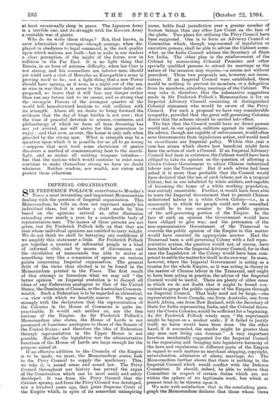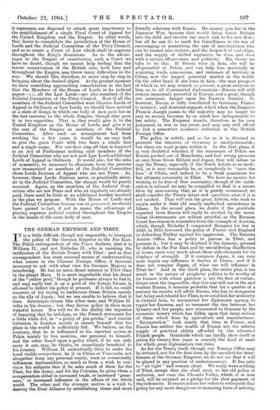IMPERIAL ORGANISATION.
Q IR FREDERICK POLLOCK contributes to Monday's L.-/ Times a most interesting and important Memorandum dealing with the question of Imperial organisation. This Memorandum, he tells us, does not represent merely his individual ideas, but is rather a draft made by him based on the opinions arrived at, after discussion extending over nearly a year, by a considerable body of representative men. The names of these persons are not given, but Sir Frederick Pollock tells us that they are men whose individual opinions are entitled to carry weight. We do not think we shall be betraying any confidence if we amplify this statement a little. Sir Frederick Pollock got together a number of influential people in a kind of informal club, and by means of discussions and the circulation of memoranda was able to arrive at something very like a consensus of opinion on various points concerning Imperial organisation. The general drift of the views thus elicited is to be found in the Memorandum printed in the Times. The first result of this attempt to formulate what we may call " the better opinion ' on Imperial evolution is to discard all ideas of any Federation analogous to that of the United States, the Dominion of Canada, or the Australian Common- wealth. Such a Federation is to be regarded as chimerical, —a view with which we heartily concur. We agree as strongly with the declaration that the representation of the Colonies in the House of Commons is quite im- practicable. It would suit neither us, nor the free nations of the Empire. As Sir Frederick Pollock's Memorandum also states, the House of Lords is not possessed of functions analogous to those of the Senate of the United States ; and therefore the idea of Federation through representation in the Upper House is not possible. Neither the legislative nor the administrative functions of the House of Lords are large enough for the purpose aimed at. It an effective addition to the Councils of the Empire is to be made, we must, the Memorandum states, look to the Privy Council to supply the machinery. This, we take it, is sound sense and sound law. The Privy Council throughout our history has proved the organ of the Constitution which can be most easily and safely developed. It was from the Privy Council that the Cabinet sprung, and from the Privy Council was developed, not a hundred years ago, that great Supreme Court of the Empire which, in spite of its somewhat uninspiring name, holds final jurisdiction over a greater number of human beings than any other Law Court on the face of the globe. Two plans for utilising the Privy Council have been suggested. One is to form an Advisory Council or Committee which, though unpossessed of legislative or executive powers, shall be able to advise the Cabinet some- what as the India Council advises the Secretary of State for India. The other plan is the reinforcement of the Cabinet by summoning Colonial Premiers and other specially qualified persons to attend its meetings as the nature of the occasion may require,—a course not without precedent. These two proposals are, however, not incon- sistent. If an Imperial Council were established, there would be nothing to prevent its members, or a delegation from its members, attending meetings of the Cabinet. We may take it, therefore, that the substantive suggestion made in Sir Frederick Pollock's Memorandum is for an Imperial Advisory Council consisting of distinguished Colonial statesmen who would be sworn of the Privy Council. For such a proposal we have very considerable sympathy, provided that the great self-governing Colonies desire that the scheme should be carried into effect.
The fact that the Council would have no direct powers would not, in our opinion, militate against its usefulness. Its advice, though not capable of enforcement, would often save Governments from injudicious action, and would tend to co-ordinate our Imperial policy. Within this year a case has arisen which shows how beneficial might have been the action of such a Council. If an Imperial Advisory Council had been in existence, the Cabinet would have been obliged to take its opinion on the question of allowing a Crown Colony Government to admit Chinese indentured labour into the Transvaal. But if such advice had been asked it is more than probable that the Council would have declared that the use of such labour, not in a tropical Colony, but in one inhabited by white settlers, and capable of becoming the home of a white working population, was entirely unsuitable. Further, it would have been able to warn the Imperial Government that to permit Chinese indentured labour in a white Crown Colony—i.e., in a community in which the people could not be consulted —would be to run counter to the public opinion of the self-governing portion of the Empire. In the face of such an opinion the Government would have been obliged to give way, and the pretension of the non-representative Government of the Transvaal to override the public opinion of the Empire in this matter would have received its appropriate answer. Had the Transvaal been a self-governing Colony with a full repre- sentative system, the question would not, of course, have been taken before the Imperial Advisory Council, for in that case the Legislature of the Colony would have been com- petent to settle the matter for itself in its own way. In cases, however, where the Imperial Government is acting as a trustee for the whole Empire, as it was acting in theory in the matter of Chinese labour in the Transvaal, and ought to have been acting in practice, the advice of the Imperial Council would be useful. There are plenty of other cases in which we do not doubt that it might be found con- venient to gauge the public opinion of the Empire through an Imperial Council. That body need not be large,—one representative from Canada, one from Australia, one from South Africa, one from New Zealand, with the Secretary of State for India representing India, and the Colonial Secre- tary the Crown Colonies, would be sufficient for a beginning. As Sir Frederick Pollock wisely says, " the experiment might be begun on a modest scale ; if it failed to justify itself, no harm would have been done. On the other hand, if it succeeded, the results might be greater than any man now living can forecast." A very important function incidentally suggested for the Imperial Council is the organising and bringing into legislative harmony of the laws and regulations in different parts of the Empire in regard to such matters as merchant shipping, copyright, naturalisation, admission of aliens, marriage, &c. The Memorandum further shows that there is nothing in the Imperial Council which would conflict with the Defence Committee. It should, indeed, be able to relieve that Committee in respect of certain duties which are not within the sphere of its legitimate work, but which at present tend to be thrown upon it.
We note with satisfaction that in the concluding para- graph the Memorandum declares that those whose views it represents are disposed to attach great importance to the establishment of a single Final Court of Appeal for the United. Kingdom and the Empire. In other words, they desire to consolidate the jurisdiction of the House of Lords and the Judicial Committee of the Privy Council, and so to create a Court of Law which shall be supreme throughout the King's dominions. As to the advan- tages to the Empire of constituting such a Court we have no doubt, though we cannot help feeling that the innate conservatism of the British race, both here and throughout the Empire, may throw many difficulties in the way. We should like, therefore, to move step by step in bringing about the desired object. At the present moment we have something approaching consolidation in the fact that the Members of the House of Lords in its judicial aspect—i.e., all the Law Lords—are also members of the Judicial Committee of the Privy Council. Now if all the members of the Judicial Committee were likewise Lords of Appeal in Ordinary or Law Lords, we should have arrived at a state of things in which one body of men gave law in the last resource to the whole Empire, though they gave it in two capacities. That is, they would give it to the United Kingdom as the House of Lords, and give it to the rest of the Empire as members of the Judicial Committee. After such an arrangement had been working for a few years it would be an easy task to give the great Court with two faces a single face and a single name. For our first step all that is required is an Act of Parliament making such members of the Judicial Committee who are not now Law Lords additional Lords of Appeal in Ordinary. It would also, for the sake of symmetry, be necessary to eliminate from the persons now enumerated as members of the Judicial Committee those Lords Justices of Appeal who are not Peers. As, however, these Lords Justices never, or practically never, sit in the Judicial Committee, the change would be purely nominal. Again, as the members of the Judicial Com- mittee who are not Peers and who sit regularly are already paid, there need be little or no additional burden involved in the plan we propose. With the House of Lords and the Judicial Committee become one in personnel, we should have gained in fact, if not in name, the advantage of placing supreme judicial control throughout the Empire in the hands of the same body of men.











































 Previous page
Previous page